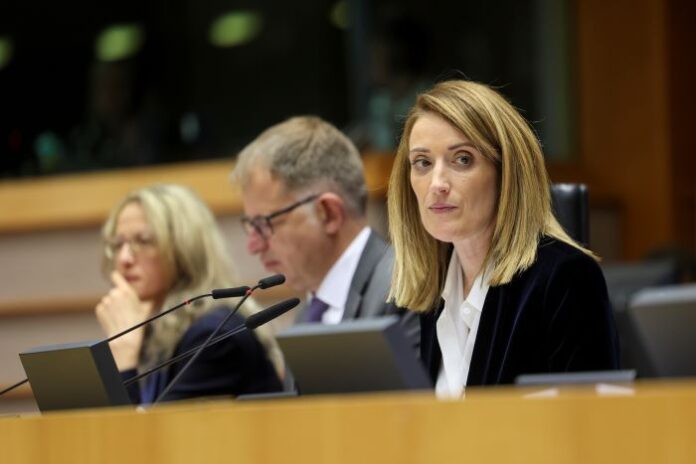MEPs have approved a major overhaul of the European Union’s migration laws, their latest effort to end years of division over how to control and manage entry and access to the bloc by thousands of unauthorized migrants, and a move calculated to undermine the far right’s vote-winning campaign issue ahead of June’s European parliamentary elections.
Wednesday’s proceedings in the European Parliament (EP) were disrupted briefly as demonstrators in the public gallery bearing the slogan “this pact kills” urged legislators to “vote no!”
In order for the revamped legislation to take effect, all 27 EU member states must now endorse the reform package, possibly in a late April vote.
This week, the MEPs approved a package of regulations and policies – the Pact on Migration and Asylum – addressing the controversial issue of who should take responsibility for migrants once they arrive and the extent to which other EU member states should be obliged to help.
EP President Roberta Metsola, who helped pave the way for the reforms, declared on X: “It has been more than 10 years in the making. But we kept our word. A balance between solidarity and responsibility. This is the European way.”
Germany’s Interior Minister Nancy Faeser congratulating MEPs on overcoming “a deep division in Europe” after years of tough negotiations. “We continue to protect people fleeing terrible wars, terror, torture and murder. But this responsibility for refugees will be spread across more shoulders in future,” she stated.
The initial plan was drawn up as a result of 1.3 million people, most fleeing conflict and war in Syria and Iraq, seeking refuge in Europe in 2015. The EU’s asylum system caved in as reception centres in Greece and Italy were over-run, while countries to the north moved to stop migrants from entering.
However, few admit to being happy with the new policy response. Even among the MEPs who helped draft sections of the new regulations, there are some who are unwilling to support the entire package.
“I’m not going to open a bottle of champagne after this,” Dutch MEP Sophie i’nt Veld, who helped shape the assembly’s position on migrant reception conditions, told reporters ahead of the plenary session in Brussels. Swedish MEP Malin Bjork, whose Left group voted against the pact, noted that the reform package “undermines the individual right to seek asylum” in Europe, pointing out how it would build on plans some EU countries already have in place to process migrants abroad.
The new rules include a number of contentious measures. For example, facial images and fingerprints could be taken from children aged 6 and above; people can be detained during screening; fast-track deportation could be applied to those denied permission to stay. Offsetting this, countries could be obliged to help their EU partners by offering to house migrants deemed eligible for asylum or, failing that, to pay the costs of lodging them elsewhere.
Most migrant and human rights groups have condemned the reform package. A statement representing the views of 22 NGOs,and charity groups, including the International Rescue Committee and Oxfam, claims the pact “fails to offer sustainable solutions for people seeking safety at Europe’s borders.” They did, however, allow that reforms governing the resettlement of migrants to Europe from outside the bloc offered “a glimmer of hope for many refugees across the globe.”
Amnesty International’s Eve Geddie bluntly declared the reforms an EU “failure to show global leadership.” For people escaping conflict, persecution, or economic insecurity, the proposed measures “will mean less protection and a greater risk of facing human rights violations across Europe — including illegal and violent pushbacks, arbitrary detention, and discriminatory policing,” she said.
With an eye to the bloc-wide EP elections slated for 6-9 June, Europe’s mainstream political parties have pushed for agreement on the reform pact. The centrist political parties believe the reforms directly address concerns about a burning issue that to date has proved to be a consistent vote-winner for parties on the far-right.
Former Polish prime minister Beata Szydlo, a member of Poland’s nationalist Law and Justice (PiS) party, denounced the pact with a posting on X. “The migration policy of the EU is wrong and needs to be changed. But you can’t put out the fire by adding more oil to it,” she said.
Much of the uproar over migrants in Europe focuses on the tiny minority of those entering on unseaworthy boats or crossing EU borders on foot. Each year, millions enter legally. Fewer than 10% live in the EU illegally, and the majority of those entered with permission but refused to leave when their visas expired.
The main challenge, once the regulations are endorsed by the individual EU member states, is whether they will act to fully implement them, and whether the European Commission, will step up to enforce the rules, given its record of failing to do so as it sought to avoid exacerbating the political crisis in recent years.

